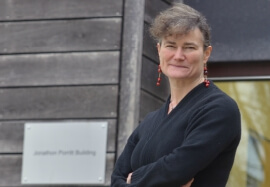
CCRI Director, Janet Dwyer, is one of only 36 key experts invited to take part in a conference organised by Parliament to consider some of the key policy areas affected by the UK’s decision to leave the EU.
The future path of policy is uncertain following Brexit and when the Government starts to negotiate the withdrawal process, the current situation in a range of policy areas is likely to change.
With this in mind, a small number of key experts in different policy areas have been invited to share their expertise at ‘Brexit: an academic conference’, which is to be held in the Houses of Parliament on 10th November 2016.
The purpose of the day will be to discuss the effect of Brexit on different policy areas and help researchers and academics connect, network and share expertise and ideas.
Policy areas under discussion will include Immigration, Trade Relations and Economic Impact, Science and Research, Foreign and Security Policy, Energy and Climate Change and Environment, Agriculture and Fisheries.
Janet has been invited to take part in the discussion session for Environment, Agriculture and Fisheries and her role will focus on likely changes in land management and rural development post Brexit.
Janet, who has recently given evidence to the Climate Change, Environment and Rural Affairs Committee in Wales on the future of agriculture and rural policies in Wales, said:
“Whilst we have seen policy shifts in the past, Brexit heralds a period of unprecedented change. Once the Brexit process is triggered, we will enter into a very uncertain period as negotiations take place. I am delighted to have the opportunity to bring my many years of experience working with and researching UK and EU policy, as well as rural development and land management, to the conference to help identify and explore some of the major issues that we face.”
Janet will bring four key issues to the conference: They are that policy makers should:
1. Think through (and monitor) the process of how, when and where impacts will occur and how best to manage them, if / as future UK agricultural support is reduced
2. Invest now in action to strengthen sector resilience and environmental sustainability, better to withstand market and environmental shocks and uncertainties in future
3. Recognise the interdependence between environmental, human and social values in land, which means we need to seek multiple goals through a common process, avoiding ‘silo’ strategies which only deal with single issues
4. Link market players and public policy goals, so government works more with partners in the whole agri-food chain to recognise common interests and responsibilities and address our needs and trends together (e.g. Defra working with the big food multiples to agree how best to sustain the UK’s domestic production, if/as our trading conditions with the rest of the world change).




